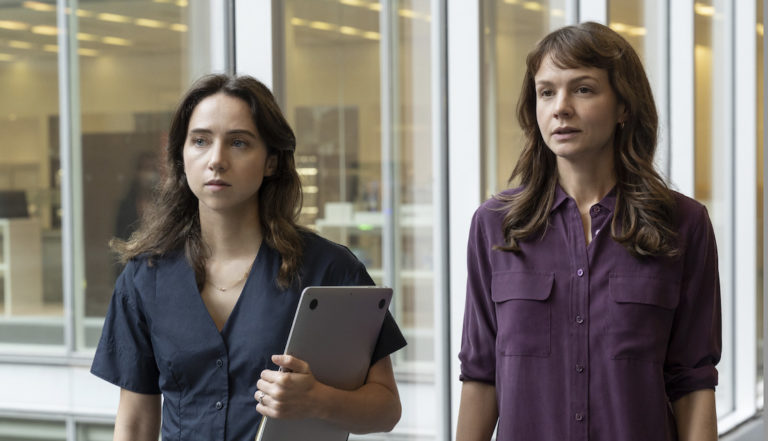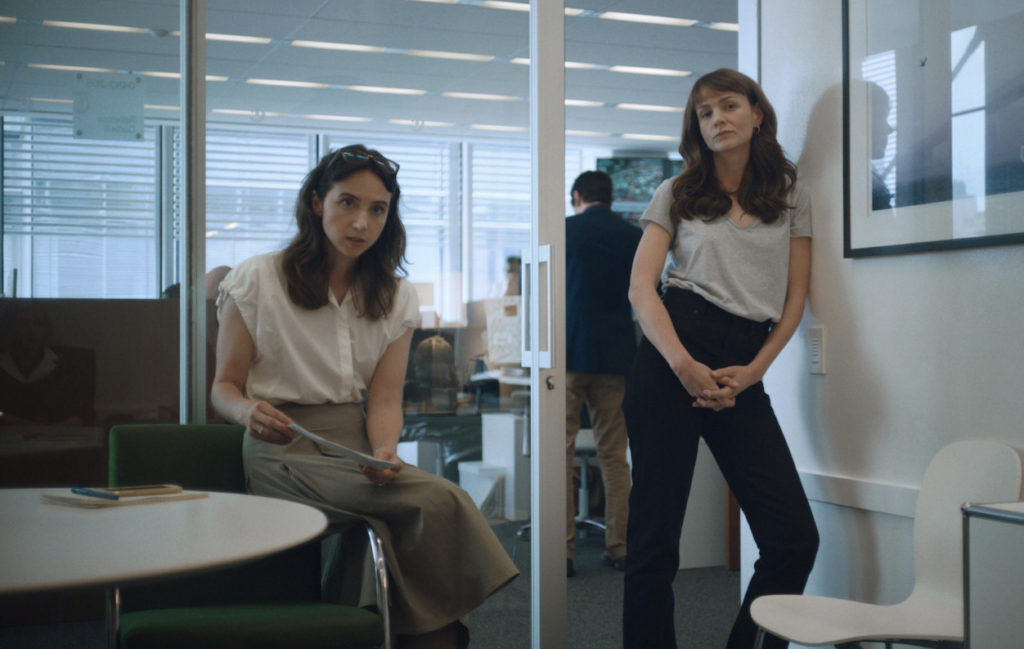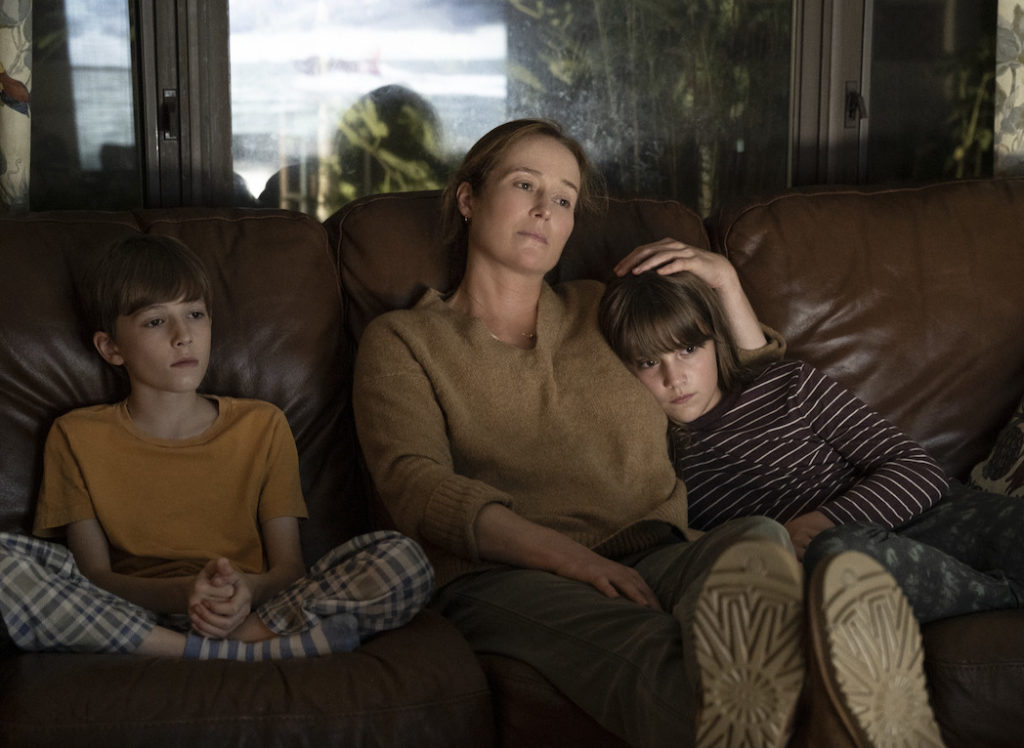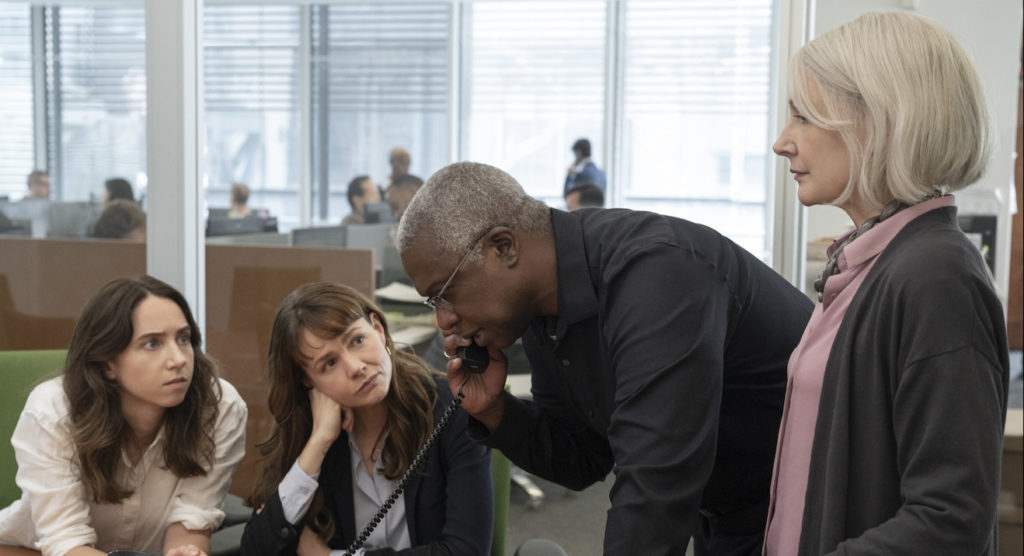

Q: How did you accept the role and what did you see that surprised you?
CM: The thing that surprised me the most was the details of what their job is. I don’t think I’d given a huge amount of thought about what investigative journalism was. When I heard about the film, without having read the script, I honestly thought about all the ways in which the film could go badly in the wrong hands and wrong screenwriter. I thought the decisions that were made early on by Rebecca Lenkiewicz and Dede Gardner, our writer and producer, were so right, sensitive and smart.
They prioritized the right things. There was no betrayal of violence towards women on screen. Weinstein is not really a character in the film, you never see his face. These are all very intentional decisions that they made. Then going into the work, it was the rigor with which these women wrote this story and what they had to go through. They had so much information by the time they ran the story and could print so little of it, because it all had to pass this incredibly high standard of journalism that could verify and back everything up. It was almost a legal document by the time it ran. That was all very surprising to me. I didn’t grasp that.
ZK: One thing that really meant something to me is when my dad saw the movie for the first time a few weeks ago. He said, “You never think about what else women are going through as they’re doing their jobs.” I thought he meant the home life stuff. He was like, “Oh yes, all of that stuff, but also like Laura Madden [Jennifer Ehle] going through her breast cancer experience.” I thought it was so moving that my father had zeroed in on this thing and then it opened his eyes, in a way. He’s a very feminist person and it still shifted his perspective. That’s the reason to include all of the rest of their lives in the movie, because you get to see them as people and not just as journalists. You see everything that they’re dealing with and everything that these sources are dealing with too.
Q: In the film, these journalists are getting messages and being intimidated by anonymous people. As female public figures, do you recognize that or have had any experience with that? How do you deal with it?
ZK: I think most women have had an experience of some kind of inappropriate attention or behavior, and being made to feel uncomfortable. We talk about those things within the context of being sexually inappropriate. They also are a form of violence or intimidation, a form of keeping people in their place. All of these things are connected, and a workplace environment that allows men to behave however they want to at the expense of women’s feeling of safety and security. That’s fostered by the same society that prompts someone to write an inappropriate message on Instagram or whatever. It’s all within the context of trying to support the patriarchy. One of the things that’s been really moving about getting to see our film in the world is that we’re hearing from people about their own personal experiences. They’re relating it to what they see in the film. We’re hoping that this film opens up that conversation and allows people to — just as the article allowed people to talk about their own experience — that this film does that as well.
CM: What you see in the film are women going through extraordinary struggle in their own lives — Laura Madden’s experience in particular — and the really high stakes of what these women were living through even before having gone on the record, then doing that with the knowledge that they could be facing death threats, people discovering where they live [and more]. At one point, Ashley [Judd] couldn’t stay in her own home for fear of [her] safety]. That was the context within which they still decided to share their stories. It takes extraordinary courage, and that strikes me every time I think about the film. They could have very easily, and rightly, gone back and focused on their own lives and never said a word, and found a different way to process this. Instead, they chose to do the opposite, this really incredibly difficult thing. That’s just remarkable.

Q: Something said in the film that was strong and clear was that perpetrators like Weinstein not only destroy lives but also careers and art. Women gave up their creative ambitions because of him. As artists, is that something you have reflected on?
ZK: I feel such a debt of gratitude to all of the women who came forward. That’s one of the things that the film speaks to, that the action of this group of women who felt themselves not to be in a position of power ended up changing our world — at least. I also feel this about the generation of women who came before us. I think we stand in a great lineage of women, and the hope is that the actions of each generation makes it easier for the next generation.
Q: When this story broke, how did you both react to it? Zoe, you were quoted by Deadline as wondering if it would change anything. Could you elaborate on that?
ZK: It’s very easy in 2022 to forget how powerful that individual seemed and how untouchable he seemed. He’d been powerful for so many decades at that point. Also, him being a bully was very well known. There was definitely stuff that came to light in these investigations that I didn’t know about. But the ethos around him was of, that person’s a bully and doesn’t behave well with women.
So it felt like, oh, this thing is a secret in plain sight — and I couldn’t believe what I was reading. I also felt like, “Well, he’s untouchable. Is it going to matter at all?” In a bigger way, I remember specifically thinking, “It’s not just this one person. It’s a whole system that supports this person and there are other people — maybe not exactly like him, but their behavior has also been facilitated by the same system.
” I really had a jaded feeling like, “This is the way that the world is”. Carey always says, and it’s true, that none of us could have anticipated what was going to come of this article and the way it fanned the #MeToo movement that was started by Tarana Burke. It was beyond anybody’s capacity to imagine. I was really proven wrong, and I’m glad that I was.
CM: I do remember reading the article. I don’t remember thinking much beyond Ashley Judd being really brave, “Wow, I can’t believe she’s done that. That’s incredible.” Again, I don’t think anyone could have anticipated what happened. I didn’t invest enormously in what had happened to that individual, but I did feel vaguely that someone of his level would be the subject of something very serious like this. I think why I was so interested in making the film is that I hadn’t given a thought to who Megan and Jodi were, the women who wrote the article. They couldn’t have known what was going to happen, but what has happened since they first published — the movement started by Tarana Burke had been propelled by this story.
It has changed the world — not that our world has changed a lot — but I do think it has created a space for conversation around sexual abuse and sexual assault and harassment in the workplace and at home that wasn’t there before. I really thought it mattered that it was these two women who did it and that we should know that, and there deserved to be a film about first of all, that it was Megan and Jodi who did it, and secondly, the survivors who put their lives on the line to tell their stories.

Q: In the five years since the Weinstein story broke, a lot has changed for the better. Yet [other women] have had MeToo experiences of their own that it’s still so difficult for them to speak out against their abusers. Do you think we will ever get to a point where there will no longer be any shame or any danger of speaking out?
ZK: I think that change has happened in the world. It has happened in our collective cultural understanding of gender. I think it starts with the way we talk to children about consent, and it moves all the way out from there. I think our Industry only reflects the world. We can be a leader in some ways, but really, we’re a reflection. Our industry is a reflection of the world, and the world that we make is a reflection of that culture that we exist within, too.
CM: What Zoe is saying is true. A lot of this comes from childhood when we learn to navigate the world as women — the way we’re forced to learn to navigate the world. Until that changes, it really has to stop at a much earlier level than expecting general behavior to change overnight. I think people are held to a different standard now. My experience is that standards are set now where they just didn’t exist before. Now we’re signing Code of Conduct [forms], having anti-harassment workshops at work and there are intimacy coordinators on set. There’s a lot in place that wasn’t there before. Of course, nothing can change drastically overnight, but I do feel things are moving in the right direction. Even as that relates to what films are being made, and what stories are being told, the fact that there are more female directors means more stories centered around the female experience. That hasn’t been seen for a long time.
Q: Hollywood has such a long history of directors who have been abusive or used inappropriate behavior, mostly towards women on set, and still are celebrated for such a long time. What is your take on how we should deal with the work of directors or actors where we now know they were abusive or mistreated women on set? How hard is it to separate the art from the artist?
CM: Gosh, it’s tricky.
ZK: That’s a bigger conversation than we have time for here today. We are all navigating this together. We’re experiencing a huge shift in our cultural conversation, and I’m so grateful for that shift. As Carey was saying, it’s not going to happen overnight. Also, it’s not going to happen all in one way. Progress is not a straight line. It’s really important that we have those conversations about how we should be thinking about a person and how we should be thinking about their work. At the same time, I don’t have any [idea] as to how to navigate that. I don’t think anybody does. We’re all trying to figure it out. There’s certain pieces of work that I really loved that I no longer watch. It’s not like I had a conscious decision that I’m not going to watch that anymore. I just find myself steering away from it. I observe myself doing that and think, “Oh how interesting, I can’t sit with that the way I used to.” But I do think that it’s very individual and something we’re all trying to navigate together.
CM: Yeah, I agree. I also think it goes along with musicians, it goes along with artists. Everywhere where someone has created something, for millennia there have been predators across the board, in all parts of society. The fact that art has been made and we should stand by it or near it or against it is, to me, individual. And it is, again, like Zoe said, such a big conversation. But yes, similarly, there’s probably music these days that I wouldn’t choose to listen to because there’s something that doesn’t sit right in my brain. Yeah, it’s too big a conversation to encapsulate in [a few minutes].
Q: How did you tap into the mindset of Jodi and Megan? What did you learn from them?
ZK: If you look at Jodi and Megan’s other articles that they’ve published in the New York Times — the other things they’ve investigated — you can see that their aim is much wider than just Hollywood. One of the most important lines in the film, for me, is when Jodi is trying to convince Megan to work on this with her and says, “If this is happening to Hollywood actresses, who else is it happening to?” They were really trying to examine a system and put cracks in a system that could support a predator like this and not just go after that predator. It’s clear in the book and from our first conversations with Jodi and Megan. That was much more on our minds than thinking about Hollywood while we’re working on this.
CM: It helped with getting into their mindset. It was really important to us that as much as possible, whilst we are actors, this film wouldn’t feel like two actors pretending or performing as journalists. Too much of it was so serious and big, and the stories being told are real. We felt a responsibility to try and capture the essence of who they were and be as honest as we could. A lot of that was understanding them and trying to understand the way that their brains work. It’s very different to the way our brains work. I think to be able to do the job they do, they need a different mindset. I’m not somebody who could ring someone up in the middle of the day and ask them about a terrible trauma that happened in their past. I’m just not capable of it. I would be too scared, or too full of self-doubt. It’s not something I can imagine. Megan is capable of that, and does it with the express belief that it’s for the greater good. It can be a part of something that can make the world better, that can expose injustice. That feels vocational to me. To try and get to spend enough time and really understand that was a big part of feeling qualified to play the women in the film.
Check out more of Nobuhiro’s articles.
Here’s the trailer of the film.

